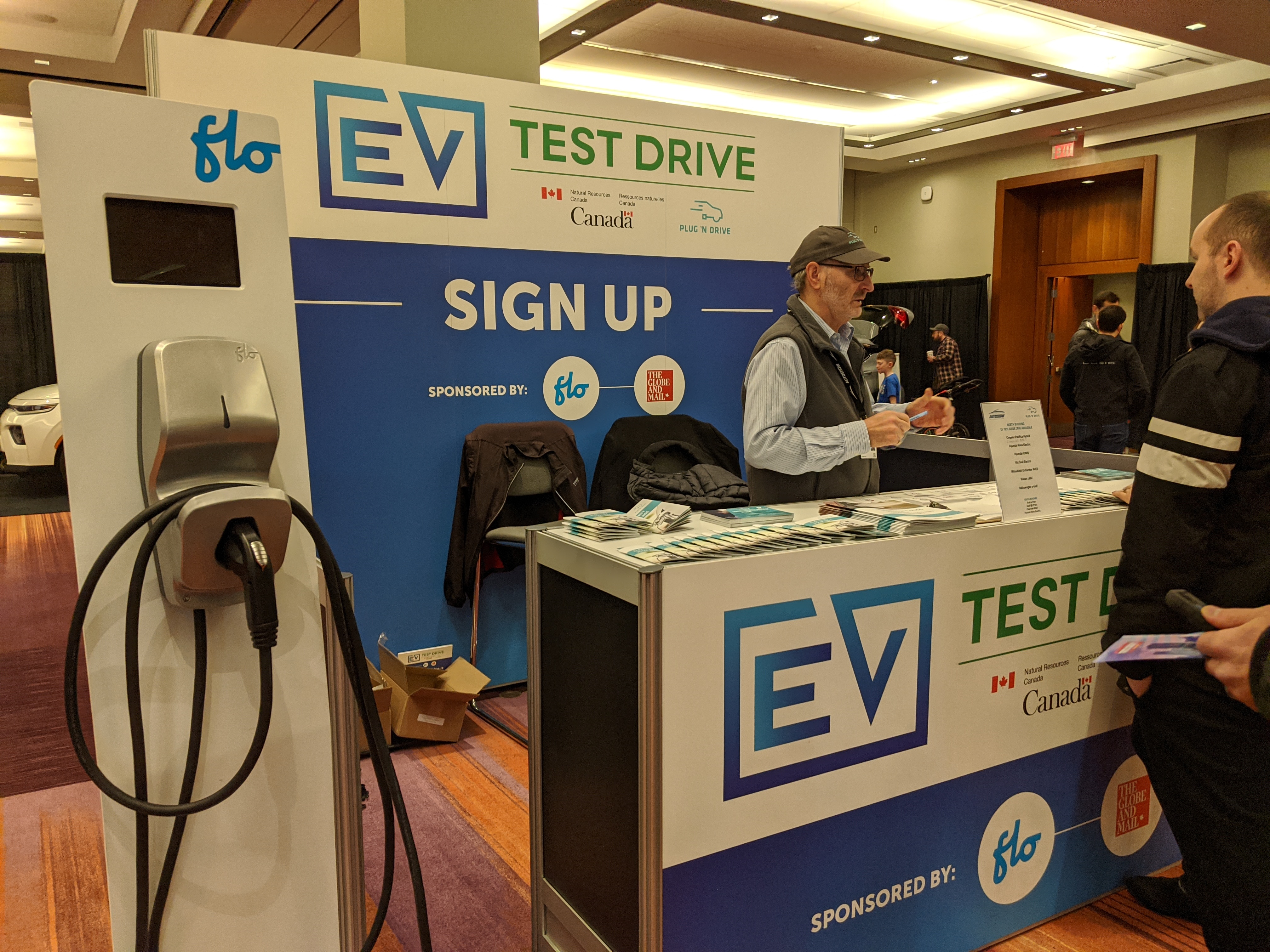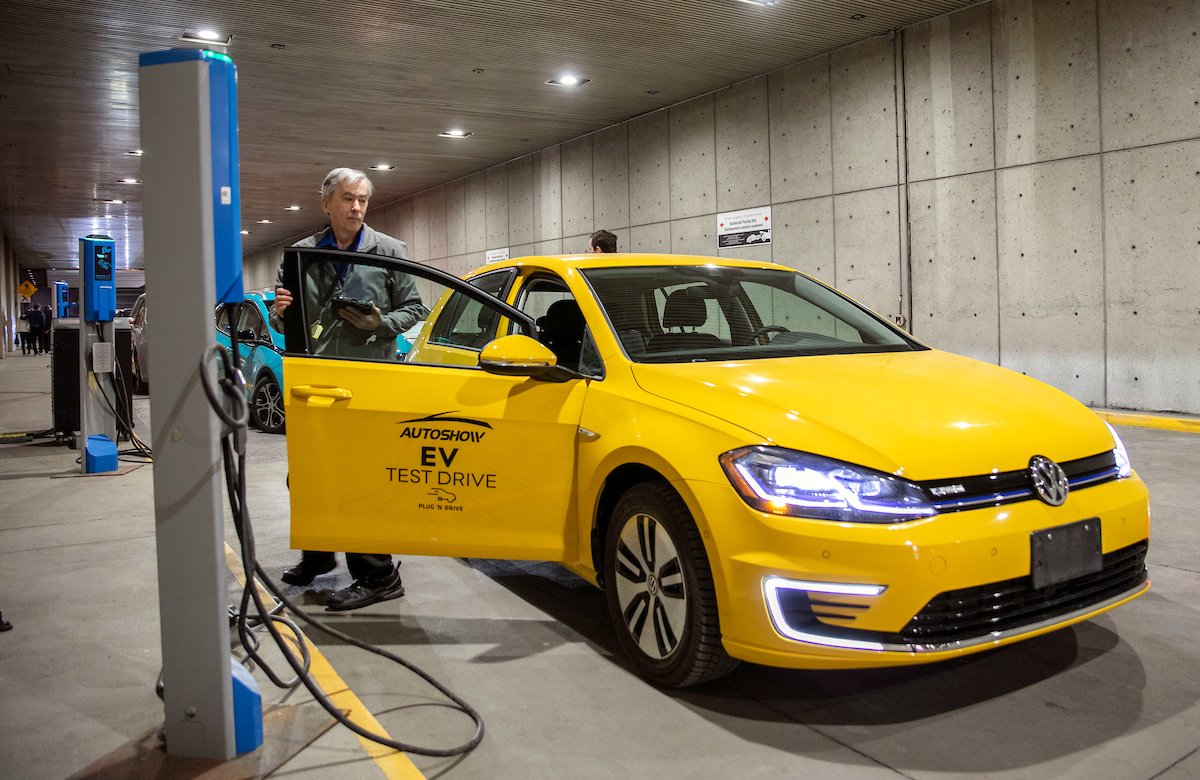Ian On EVs
This article is the main page of the site; click "Continue reading" to get to it.
In a decade or so we won’t call them "electric cars", we’ll just call them "cars". The modifier will drop away, just as dropping the "horseless" part of "horseless carriages" left only "carriages", which we shortened to "cars".
List of all EVs available in Canada, with C$ pricing, from PlugNDrive.ca.
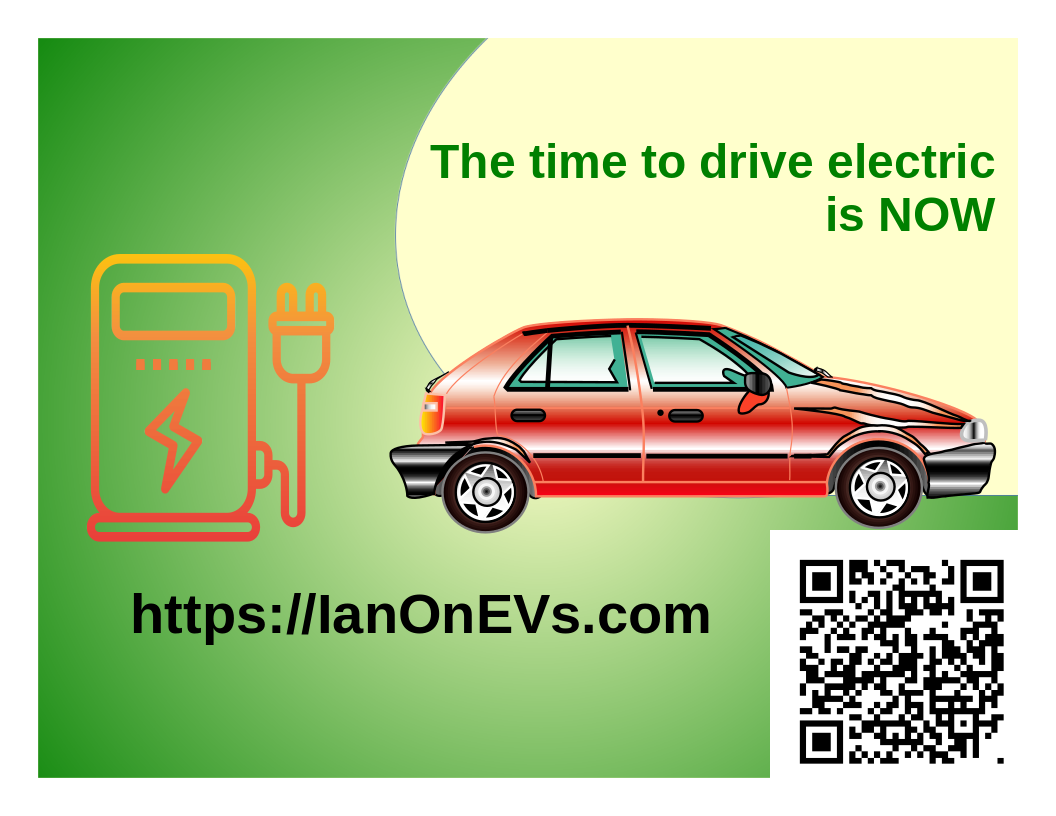
September is the time of National Drive Electric Week,
and our nearest event for 2023 was in Waterloo via WREVA,
and will be again in the fall of 2024.
Here’s my shot of the hundred or so EVs brought out by their owners.
There was a Rivian, 2 Ford F150 Lightnings (one making pancakes for attendees on an
electric griddle running of the pickup’s battery) and at least one 'Stang,
various Hyundai, Kia, Volvo and PoleStar both, Vinfast, VW, Smart, and a BMW i3
(apologies if I missed any).
It was a beautiful day, so perhaps a lot of people who might have attended
were out camping or canoeing; we spent more time in talking to other EV owners
than with potential purchasers,
and in making our Tesla sing and dance in coordination with others.

2023 is also the year of NACS, the North American Charging standard. Based on Tesla’s plug, this is being standardized, and has buy-in from all major car makers. Aptera, GM and Ford were among the first, with Hyundai being among the last; see Hyundai/Kia seen taking photos at Tesla supercharger: NACS support imminent?
The rationale for electric vehicles is so compelling it hardly needs explanation. They actually cost less, in terms of total cost of ownership, (TCO) as pointed out:
-
as Forbes confirms (University of Michigan study, via EVannex.com)
EVs are much easier on the driver. The brain-deadening particulate pollution from combustion at source of an EV is zero, the metallic-and-asbestos particulate emission from mechanical braking is drastically curtailed, the greenhouse gas emission at source is zero, and the noisy, smelly gasoline engine and its very inefficient fuel infrastructure is rendered unnecessary. Gasoline engines and especially diesel in contrast emit large amounts of particulate pollution ("soot") which sickens and kills people, even hitting them before they’re born, and adds billions of dollars to healthcare costs. Gasoline cars catch fire and burn several hundred times a day in the US, killing on average about a person a day. Both suicides and accidental deaths from carbon monoxide poisoning are another toxic effect. In fact, the internal combustion engine is already dead, it just hasn’t realized it yet. Don’t take my word for it; see here and in the Economist. Or, if you follow entrepreneurs, here’s Sir Richard Branson, founder of various Virgin Enterprises, on Why we should switch by 2025 not 2040. If you want to see my word on it, check out my Note to My Friends and Neighbors in the Oil Patch.
Overall pollution and GHG is less when EVs are used, even where dirty fuel is used to produce electricity, as has been spelled out many times, by the Union of Concerned Scientists and by the International Council on Clean Transportation and by this paper in Science Direct (original article here). Indeed, given the massive amount of energy used by refineries, and trucking the fuel to the gas station, and the pumping stations, and the gas stations with their garish all-night lighting, some have estimated that it takes more electricity (in addition to the gasoline burning!) to drive a gasoline-powered car 100 miles than it takes to drive an electric car the same distance! EVs are thus significantly more efficient than the ICE vehicles they are starting to replace. When you hear otherwise, it’s probably funded by the fossil fuel industry, stock market short sellers, or somebody with an axe to grind. See CNBC.
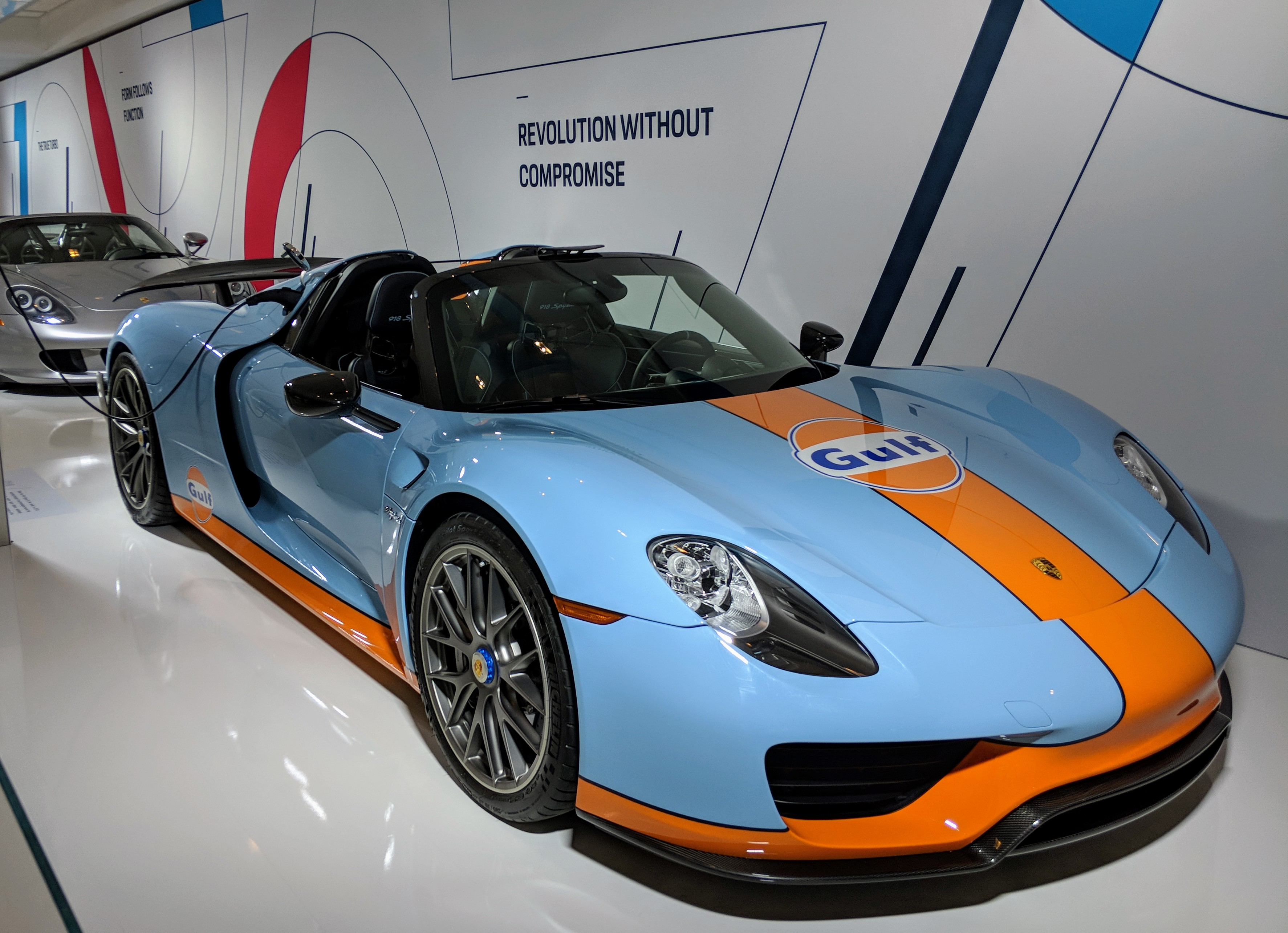
Even staid old-line makers like Jaguar and Porsche have committed to electrification. Porsche offers this discussion on the all-electric powertrain to be used in their near-future EVs, and what electrification means to the automotive world. Porsche exhibited a prototype TayCan at the Toronto Auto Show CIAS 2018. Volkswagen announced a new modular chassis plan (MEB) due to power several models of EV.
However we are creatures of habit, and habits suggest buying a regular gas guzzler or "ICE" (Infernal Combustion Engine) car. So think about the following:
-
Particulate emission - millions die every year from inhaling soot particles and, in countries where we don’t routinely cook or heat with wood or animal dung, the motor car is one of the prime contributors to this.
-
Oil dependency - while North America has cut back on fuel imports in recent years, it has done so by controversial means such as "fracking" (fracturing rocks, which is believed to cause earthquakes as well as polluting ground water sources) and the Alberta tar sands.
-
Prior to that, and still so for parts of the world, oil must be bought from places that have it, which props up dictatorial, rights-violating regimes in those parts of the world.
-
Oil transport - Lac Magantic. Nuff said. 43 humans, and most of a town, incinerated. Hundreds of tons of oil burned inefficiently.
-
Climate Change - even if you don’t accept the scientific evidence for human activity causing climate change, which you should, the other reasons are compelling.
Note that, in terms of cars, I am primarily focused on battery electric vehicles (BEVs) rather than, say, hydrogen fuel cell EVs (HFCEVs). Hydrogen at first seems like a good candidate for a fuel source as it is a very plentiful element, and "pollution free" since 2H + O → H2O - the output of this oxydation reaction is energy and water. However, the laws of physics show that you must use as much energy to drive the reduction (to split water to get the hydrogen) as you get out of the oxidation, thus already half the energy is wasted. That, plus a number of fires at hydrogen fueling stations (not to mention the long shadow of the Hindenburg) have led car makers to abandon hydrogen, most recently Daimler. Hydrogen may have a place in, for example, trans-oceanic shipping, but you won’t see it dominating on the roads of major countries.
Aside: If you find this information useful, and/or are interested in learning about or buying a Tesla, please use my referral code; if you buy a Tesla using that code, you get 1,000 miles of free supercharging credit on any new Tesla vehicle.
Electric Vehicles are here to stay
Yup. And they’ve been around a lot longer than you think. See this History of the Electric Car.
As of October, 2017, every significant car manufacturer has committed to moving to EVs including the US Big 3 (GM, Ford, and FCA), Jaguar (to invest US$18B over 3 years), Rolls-Royce, Volkswagen, and almost all German and Asian car makers. Some of these, like Porsche have said they will be 100% electric by 2030 or so. Daimler’s SmartCar lineup is already all-electric in North America and will be 100% electric in Europe by 2020.
See also the documentary Revenge of the Electric Car.
Forbes on The Disinformation about Electric Cars.
An early adopter reports that the pioneering days are over for EVs - in his view, EVs are now a thing. Yup.
The Wall Street Journal notes that electric cars will be here sooner than you think (sign-in required).
Lake Simcoe Living ran an article Charged about the future: From trucks to boats, school buses and RVs - embrace the change by Ron Groves of Plug-n-Drive (weird Adobe Flash formatting, alas).
USA Today has an article on road-tripping with EVs.
This will have impacts beyond the obvious.
The main-line ICE-car makers will be hardest hit.
Even Britain’s Royal Family is going electric.
Here’s my "top 10" list of ways electric cars will "shock" your world.
I have a presentation on Why you should ride electric that will be of interest to schools, clubs and associations, etc. At about 1/2 hour to 45 minutes this covers some background, some of the controversies, myths and realities, and the advantages of electric vehicles. If you are interested in having me present it, please contact me by email (my first name at darwinsys dot com), or using this contact form.
Charging your EV at home uses less energy than your furnace or your hot water heater, only a little more than your fridge.
EV Cars
-
Tesla is the leading maker of high-end EVs. Independent History and overview of Tesla.
-
There are so many links about Tesla that they have their own page on this site.
-
While Tesla deliberately started with expensive cars to fund downward development towards cheaper models, FCA Citroen went the other way, starting with the cheapest possible EV, the €6000 Ami.
-
What EV drivers miss (engage sarcasm detection mode before reading)
-
Chinese-owned London Taxi Company is building an all-electric version of the iconic London Taxi.
-
OpenMotors previously had a do-it-yourself platform aimed at prototyping and startups; they sell the chassis and components, with no body. They also let anyone download and use the blueprints and technical information for free to build their own! Supported by sales of their EDIT EV platform, battery swap platform, and design/engineering services,
EV Car List of Lists
-
Plug-n-Drive’s List of EVs available in Canada (includes BEVs and PHEVs).
-
Electrek’s List of cheapest EVs (US prices)
-
Electrek’s list of longest-range EVs (US prices)
-
Electrek’s best EV prices/deals (US prices)
Trucks
Truck information has moved to the Trucks Page.
Buy Used And Save?
One thing is true of almost all passenger vehicles: buy high and sell low. That is, the person who buys a new mass-produced vehicle will in most cases sell it for less than they bought it. Thus, there are often bargains to be had in the used EV market. Autotrader is one good place to look. If you’re new to EVs, you should probably buy from a dealer who specializes in EVs. OTOH, if you really know what you’re doing, you may find a real bargain on an EV that got traded in to a dealer who doesn’t know or care about EVs. There are some issues specific to buying used EVs, so please check out this used EV Buyer’s Guide by Plug In America.
Low-cost, Mostly-Three-Wheeled EVs reduce weight, complexity
-
Canadian (BC) carmaker ElectraMeccanica now shipping $20,000 one-person 3-wheel EV with 160km range
-
US maker Aptera aims to ship US$35,000+ 3-seater BEV, up to 1,000 miles range, by 2020 (see also https://chargedevs.com/newswire/aptera-returns-from-the-dead-unveils-1000-mile-ev/).
-
Dutch-made LEF looks like jet fighter cockpit on wheels, gets 55 miles of range (city only).
-
US maker Arcimoto soon shipping US$11,900 two-person in-line 3-wheel SRK, 70 or 130 mile range (more coverage in Wired).
-
Toyota’s i-Road three-wheeler concept hasn’t made it to the mass market just yet.
The A-Z of EV Motorcycles
-
The BBC writes of electric motorcycles: 'It feels like the hand of God thrusting you up the road'
-
Canadian maker Damon Hypersport offers a lot of sensors, AI, haptic feedback, push-button configuration changes, and more.
-
The iconic Harley-Davidson is bringing an electric motorcycle to market.
-
The equally iconic Vespa Scooter has an electric model.
-
Zero Motorcycles (half a dozen models, US, Canada, other countries)
There are literally dozens of companies making electric scooters, e-bikes, and of course mobility riders for seniors; far too many to list here. Find a local dealer.
Snowmobiles
-
Taiga, the Tesla-inspired snowmobile: Electrek review; Globe & Mail review; home page.
e-Bus/Subway/Streetcar/LRT manufacturers
-
First, a discussion on the inevitability of electric buses.
-
And, coverage of a report showing that Battery-powered trucks and buses are win-win-win.
-
Canadian manufacturer Lion Bus makes the world’s first all-electric Type C school bus and several other buses.
-
Lion just sold ~200 school buses in California.
-
Canadian maker Green Power Bus makes both transit buses (including a double-decker), school buses and smaller shuttles.
-
Blue Bird Type D electric school bus.
-
All the other major school bus companies join the party.
-
Chinese maker BYD ships buses from Newmarket, ON plant to Quebec.
-
Proterra (who made an 1100 mile EV bus).
-
Repeat orders and more repeat orders show e-buses are a hit with transit agencies
-
Complete Coach Works ("remanufactured electric bus for the cost of a new diesel one")
-
Twenty buses, three transit authorities, in multi-manufacturer demo of oppcharge heavy-vehicle charging protocol
-
Bombardier and many other companies make electric subway vehicles (as used by Toronto’s TTC subway), street cars (ditto), etc.
-
Toronto in fact used to have a network of electrified "trolley" buses (see earlier and later designs), but this was torn down during the 1990’s, a time of artificially-inexpensive gasoline/diesel fuel.
Industrial/Commercial
-
There are of course lots of fork lifts, golf carts, and many others that run on electricity.
-
Volvo Construction Equipment Europe offers two quiet, all-electric machines, a tracked excavator and a wheeled loader.
-
Now there are several large mining vehicles:
Electric Lawn/Garden Work
-
Ryobi Electric lawn tractor/mower and zero-turn mower (I keep my lawn and pathways kempt with the latter).
-
Cub Cadet electric zero-turn mower for home use In 2014 Consumer Reports called it "the Tesla of mowers" though others should share that honor today.
-
Keep your lawn trim on automatic with the Husqvarna AutoMower line
-
Commercial-duty (and priced) Mean Green Products CXR5260 all-day mower, solar charge-boost option.
-
Pioneering Elec-Trak lawn tractor from the 1960’s/70’s; list of Elec-Trak on eBay
Electric Farming and Forest Care
-
Battery-powered electric tractor SESAM (prototype) by John Deere
-
Corded(!) electric tractor by John Deere - autonomous, and includes cord management so it doesn’t run over the cable - thus can do entire fields, and be shared amongst several smaller farms.
-
Electric Chain Saws by
Ban the ICE for personal transport!
No, I did not come up with this idea, though it’s probably a good idea, in the name of governments protecting us from the aggression of pollution. Several countries and jurisdictions have had the idea. Most of these are not yet passed into law. But some of them will.
I maintained a list here for a while, but now there are so many countries banning ICE cars that my list was perenially out of date, so I happily defer to Wikipedia’s List of Countries (and Cities) Banning Fossil Fuel Vehicles.
EV Information and News Sites
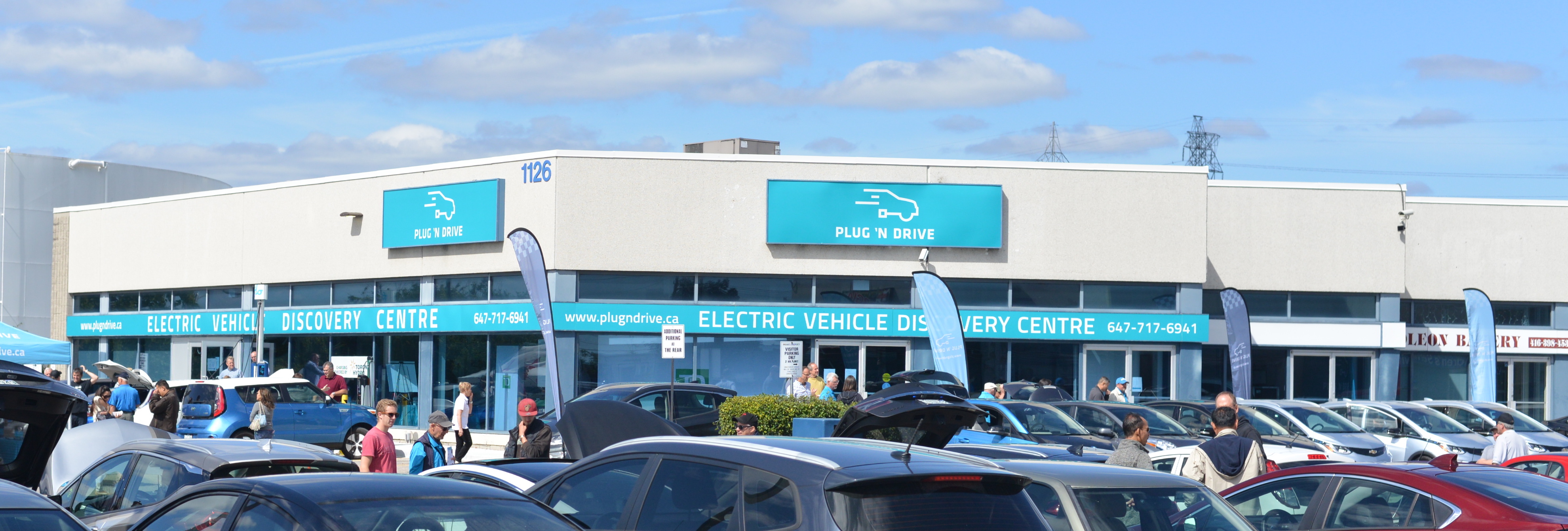 Plug-n-Drive Discovery Centre
Plug-n-Drive Discovery Centre
-
Canadian advocacy group PlugNDrive.ca has a lot of information on the benefits of EVs as well as details on models sold in Canada. They run Canada’s first Electric Vehicle Discovery Centre (North York location), run a test drive program at the Canadian International Auto Show (CIAS, aka the Toronto Auto Show), perform outreach at many other events, and publish a booklet listing all BEVs and PHEVs on sale in Canada.
|
Plug-n-Drive booth at CIAS2020 |
Ian guiding test rides with Plug-n-Drive at CIAS2020. Photo: Marcus Oleniuk http://www.oleniuk.com. |
|
-
EV Society advocates for EV adoption in Ontario. Chapters in several cities.
-
U.S. advocacy group PlugInAmerica.org similar to Plug-n-Drive has lots of information for the US market.
-
Drive Electric US is funded by a consortium of car makers and US states (but excludes any mention of Tesla, since it’s from the old-line car makers).
-
Electrek is one of the leading EV journo sites
-
The similarly-named but unrelated Inside Autos EV News
-
Find an EV-friendly electrician (Canada)
-
Tesla:
Advocacy
While this whole web site could be construed as EV Advocacy, here are some things I’ve written and published or made available;
-
My "Ask Me About My Electric Car" advocacy brochure.
-
My write-up on EV ownership.
-
My article on EVs for sale in Canada.
